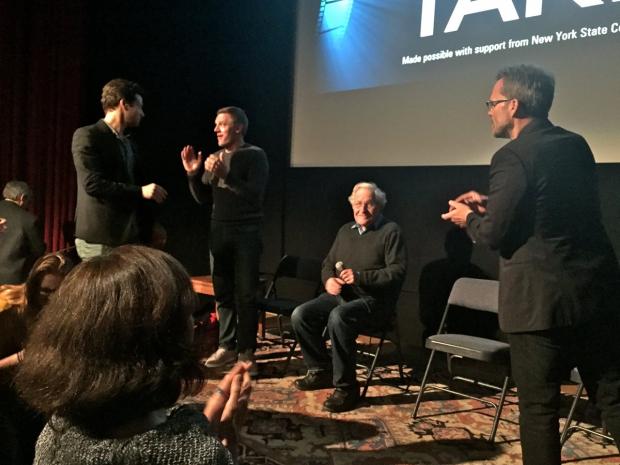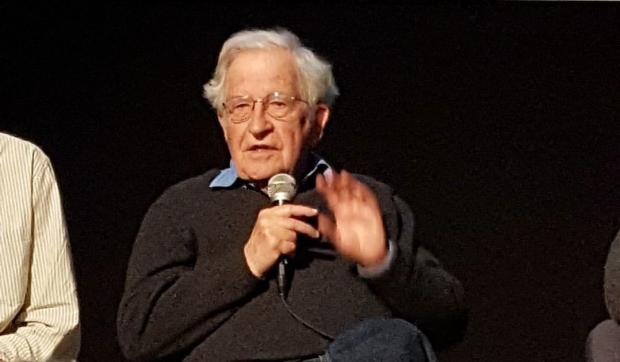After the Requiem, Chomsky answers questions
Primary tabs
Went to see REQUIEM FOR THE AMERICAN DREAM - The Chomsky Documentary yesterday at The Little Theatre. This was the first time Noam Chomsky saw the film himself. He was seated right in front of me. I was tempted to take a picture of the back of his head, with the film playing in front of him and post it with the caption "Chomsky watching Chomsky" or something to that effect but then I thought it would be too juvenile and with much self-discipline, I abandoned the idea.
photo: Mara Ahmed
The documentary is excellent. It parses hours and hours of interviews with Professor Chomsky and creates a clear and engaging narrative. As a filmmaker, I understand the challenge. How do you take a series of lectures by one of the most eclectic intellectuals of our time and cut them into a cogent and gripping 73 minute film? The answer: sharp editing, copious b-roll and terrific graphics and animation. The importance and urgency of what Professor Chomsky is saying helps too, of course. He talks about the concentration of wealth and power in the hands of a few (a fraction of one percent) and puts this phenomenon in a historical context, he explains how the "rabble rousers" of the 60s and 70s were crushed, how the media and their focus on consumption have produced a "me" culture and undermined solidarity, and how this will continue to shape an increasingly ugly society. The film ends on a positive note by reminding us of Howard Zinn and his bottom-up view of history - the idea that the countless small actions of unknown people drive all great historical events. Ultimately it's always been, and it continues to be, up to us.
photo: Mara Ahmed
watch the Q & A with Noam Chomsky (sadly, the video cut out at the last question and a half and so audio was utilized toward the end)
In the post screening Q&A, I got to make a comment. I told Dr Chomsky that as a Pakistani American filmmaker I had shot a film in Lahore in 2009. The film was a broad survey of public opinion about issues of interest to Americans, e.g. the Taliban, the War on Terror, American foreign policy in the region, and a polling of what average Pakistanis thought about Americans. I interviewed a wide spectrum of people and most of them were quite politically astute. Many talked about the corporate nature of American media and how the American public was totally brainwashed. Yet some mentioned Dr Chomsky by name and said, "But then there are also people like Noam Chomsky in America." The audience applauded vehemently. I concluded with how it was important for him to know that, even as a single individual, he's an antidote to American imperialism and aggression. Again much applause. In typical Chomsky style, he evaded the compliment completely and began to talk about international polls and how public opinions around the world are of immense consequence. He ended by complimenting me on recognizing that fact. Nate Baldo asked a brilliant question about American military aid to Israel and increasing grassroots resistance to the occupation. Interestingly enough that was the issue Dr Chomsky spent most of his time discussing. Of course he did not mention BDS, but this was a full house (500 people or more) and an excellent forum for educating people on Israel/Palestine. All in all, a spectacular evening with an intellectual icon.
Related: Noam Chomsky gives talkback about decline of American dream | Direct Action, Occupy and the Power of Social Movements: An Interview With Noam Chomsky | Noam Chomsky on the Cuban 5 | Atypical Tea Partier A Typical Tea Partier | The Propaganda Box | BTL:Noam Chomsky Offers Views on Motivation for Iraq War and...
feature photo: Miriam Steinberg












